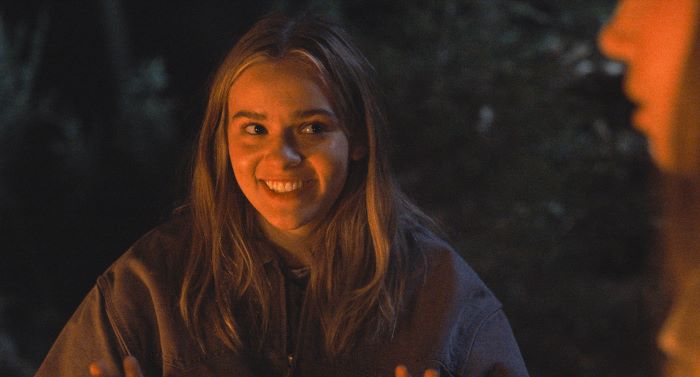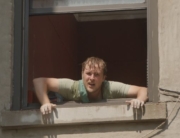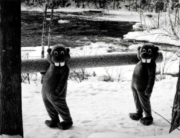By happenstance, I viewed three new movies in a row in which characters examine new and past versions of themselves. In A Different Man, Sebastian Stan’s character is treated for neurofibromatosis and attempts a new existence. Demi Moore’s Elisabeth Sparkle takes The Substance and another, younger version of herself is born. In Megan Park’s My Old Ass, newly 18-year-old Elliott (Maisy Stella) connects with her 39-year-old self (Aubrey Plaza). These films are slippery and idiosyncratic in some respects, though Park’s movie is probably the most conventional of the bunch.
It’s still a tender, occasionally aching film, with an appealing cast and pretty locations (shot in Muskoka Lakes in Canada). Like many older teenagers, Elliott is free-spirited and angsty. She lives on her family’s sprawling cranberry farm and is ready to embark on what she hopes will be a more exciting life in school in Toronto. She is somewhat distant from her family, including her loving, low-key mom (Maria Dizzia); her bland, golf-playing brother Max (Seth Isaac Johnson); and her youngest, Saoirse Ronan–obsessed brother, Spencer (Carter Trozzolo, a nonbinary actor who imbues scenes with a lot of humor). Elliott would rather hang out with her friends, Ro (Kerrice Brooks) and Ruthie (Maddie Ziegler), and her hook up with Chelsea (Alexandria Rivera).
While celebrating her birthday in the woods taking mushrooms with her two friends, Elliott is suddenly visited alone by her older self. This is where the viewer needs to take leaps of faith: Are you willing to buy this premise, and are you willing to buy Plaza as an older version of Stella? Lesser performances may have made this a struggle, but the actors here shade their characters with sardonic bite that’s irresistibly humorous. Their approach and styles are diametrically opposed, creating an appealing mix. Stella is naturalistic and open, Plaza is thorny and guarded.
For a film with such a snarky main character and an unusual premise, it’s very pastoral-looking, with glinting sunlight and lush summer scenery. (The film was shot by Kristen Correll.) It’s backed by a gleaming Tyler Hilton and Jaco Caraco score, faintly reminiscent of On Golden Pond. At some points, the film peters out, especially when a potential romance blooms with Elliott’s first male crush, farm worker Chad (Percy Hynes White). This plotline ultimately becomes the film’s main source of suspense: Older Elliott warns her of avoiding Chad at all costs, but why?
Though Park’s handling of the fluidity of identity and queerness is often inspired, an overlong Justin Bieber–inspired trip of Elliott fantasizing about Chad is pretty cringey and unfunny. With a cutesy romance, sentimental score, and sweeping shots of bodies of water, the movie at times perilously approaches the look and feel of a Nicholas Sparks film adaptation. Luckily, Older Elliott’s advice to the younger Elliott to hang out more with the family isn’t so predictably cheesy or neatly uplifting. It’s especially funny when younger Elliott tries to bond with Max, and both realize the two will probably just never fully click. Plaza, sorely missed when she’s not around on-screen, ultimately and subtly lends the film some unexpected gravity toward its conclusion. For those past their 20s, it may prompt them to review and analyze their cusp of adulthood, even if Elliott’s life is entirely different than their own.

















Leave A Comment